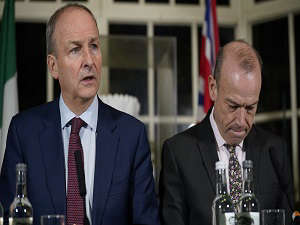
By David Young, PA
The continued reliance on single-year budgets in Northern Ireland is hampering planning and innovation across public services, auditors have warned.
The Audit Office highlighted the problems associated with 12 month spending plans, including the limitations on carrying unspent funding forward, in a report on the budgetary process at Stormont.
The report raised concerns about Northern Ireland’s budgetary process, which allocates £14 billion of funds per year, highlighting that the current arrangements only meet one of 10 international best practice principles set out by the Organisation for Economic Co-operation and Development (OECD).
The continued reliance on single-year budgets in Northern Ireland is hampering planning and innovation across public services, auditors have warnedhttps://t.co/m7Ib4lLCrI
— Q Radio News (@qnewsdesk) June 29, 2021
Auditors acknowledged that the Stormont Executive could only set multi-year budgets if the Treasury gave multi-year funding commitments to the region.
The last multi-year budget set by the Executive covered the period 2011 to 2015. Since then, including the three years when the Assembly was collapsed, the budgets have all been one-year.
The Audit Office report stated: “The short-term nature of annual budgets creates difficulties for future planning and innovation across the public sector.”
Health Minister Robin Swann has been one of the most vocal critics of one-year budgets, claiming they are undermining his ability to implement reforms to tackle the region’s waiting list crisis.
Earlier this month, Finance Minister Conor Murphy told the Assembly that the Executive was to begin preparations on a draft multi-year budget for 2022 onwards after receiving an indication from Chancellor Rishi Sunak that the Treasury would announce a multi-year spending review later this year.
The Audit Office report said one-year budgets were often necessary, noting that the most recent single-year spending review by the Treasury was set amid the uncertainty of the Covid-19 pandemic.
“While single-year budgets may sometimes be necessary, good practice suggests that the aim nonetheless should be to move to multi-year budgets as soon as possible,” said the report.
“The New Decade New Approach agreement included a commitment to using multi-year budgets where the UK Government has provided multi-year funding.”
The auditors added: “Under Treasury rules the NI Executive has limited ability to carry forward unspent funds from one year into the next and underspends above tight limits set by Treasury are lost to NI.
“This increases the risk to sustaining funding of multi-year programmes and the risk that money spent quickly before the end of the financial year may not always be spent well.”
As well as the issues around single-year budgets, the report also raises concern about:
– Restricted opportunities for the Assembly and its committees to debate draft budgets and any in-year re-allocations;
– A lack of sufficiently detailed information available to aid Assembly scrutiny;
– Budget information not being easy for non-finance professionals to understand;
– A lack of clear links between the budget and the desired outcomes in the Executive’s Programme for Government (PfG).
Publishing the report, Comptroller and Auditor General Kieran Donnelly welcomed recent initiatives, such as the establishment of a fiscal council to provide independent oversight of the budget process and a fiscal commission to examine spending powers currently held by Stormont and whether there is scope for the administration to raise more of its own revenues.
“It has never been more important to ensure that public money is being managed and spent well,” said Mr Donnelly.
“Getting the budgetary process right is fundamental to ensuring economy, efficiency and effectiveness in the delivery of public services. This is illustrated time and time again in my reports.
“There is an opportunity now to build and improve on the current process.”
Responding to the report, Mr Murphy said: “As a devolved administration we need to have greater control over public spending and be able to plan to the future.
“The only way to do this is a multi-year budget process and I will continue to press for this approach.
“In recent months, I have established the Fiscal Council and Fiscal Commission to provide independent advice on longer term sustainability and fiscal risk and I anticipate that both bodies will provide expert assessment on these areas moving forward.
“I am committed to improving the transparency of public sector finances and improving the budget process. The pandemic has brought new economic challenges and it is vital that the limited public money we have is allocated to key areas, benefiting those who need it the most.
“We will examine the report findings and identify where improvements can be made to the budget setting process.”
NIAO director Neil Gray points out that some problems surrounding the allocation of £162 billion since 2007 are outside the scope of the Department of Finance and Executive Office.
He says: "We compared the Northern Ireland budget practice to the good practice with the OECD's ten principles of budgetary governance. Northern Ireland met only one of the principles fully. The process partly meets another seven of the principles of good practice but for two of the principles substantial work is going to be needed."

(The annual budget only meets one of ten international standards of good practice)


 Teenage girl killed in road crash named as Kamile Vaicikonyte
Teenage girl killed in road crash named as Kamile Vaicikonyte
 Covid-19 inquiry ‘an opportunity for candour’ from Stormont leaders
Covid-19 inquiry ‘an opportunity for candour’ from Stormont leaders
 UK and Irish ministers to meet amid row over migration
UK and Irish ministers to meet amid row over migration
 Three men set to go on trial for murder of journalist Lyra McKee
Three men set to go on trial for murder of journalist Lyra McKee
 Swann refuses to rule out resigning if budget is not changed
Swann refuses to rule out resigning if budget is not changed